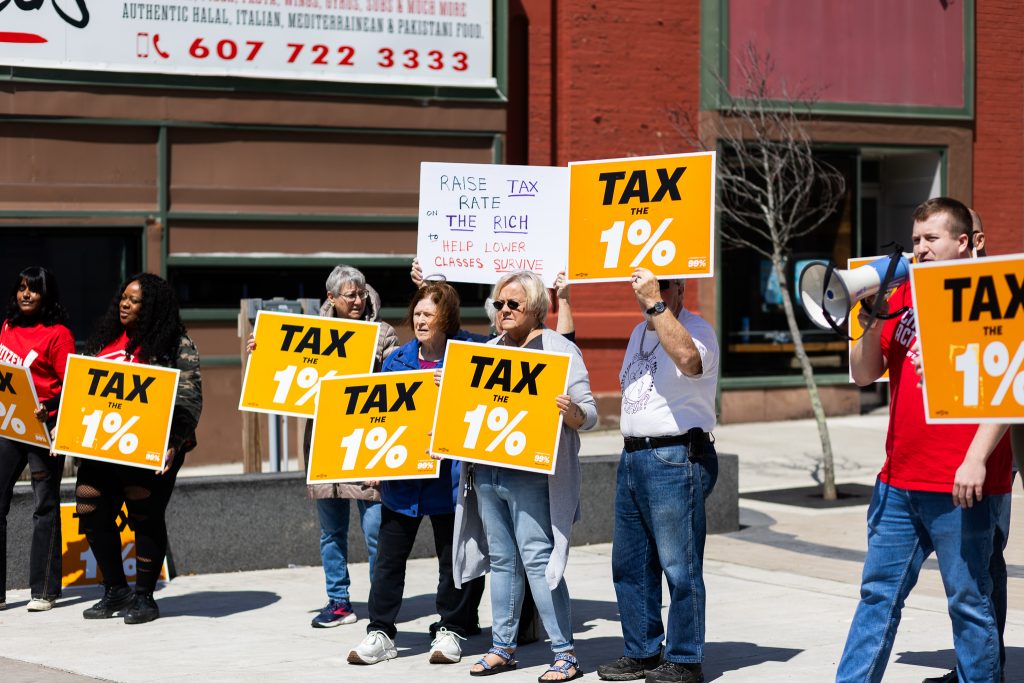Activists gathered Monday in Downtown Binghamton to protest Rep. Marc Molinaro’s tax policies.
They convened at noon near the Metro Center on Court Street to speak out against Molinaro’s alleged unwillingness to support a tax raise for the wealthy. The protest, organized by activist groups Citizen Action New York, Indivisible Binghamton and Empire State Voices, coincided with Tax Day, the last day for Americans to file federal income tax returns with the Internal Revenue Service. The demonstrators held signs reading “Tax the 1%” and called for an increase in taxes on the wealthy to allow for increased funding toward social security and services like health care and child care.
“Molinaro has consistently voted against working and middle-class people in NY–19,” Ravo Root, a Citizen Action community organizer, wrote. “He has voted for extensive cuts to social programs and has shown [a] complete unwillingness to raise taxes on the wealthy and the one percent. Making the uber-wealthy pay their fair share is overwhelmingly supported by voters in this district. […] The bare minimum that [Molinaro] can do is tax the ultra-rich, but then again, that would be going against his nearly entire donor base of the most profitable corporations and the ultra-rich.”
In response to Monday’s protest, Molinaro’s office told WBNG that he grew up poor and recently voted for the Tax Relief for American Families and Workers Act, which would expand the maximum refund a parent could obtain per child from $1,600 to $1,800. In March, Molinaro helped to secure $27.6 million in funding for his district aimed at creating veteran housing, improving infrastructure and expanding health care services, among other reported goals. Last year, Molinaro joined Democrat Adriano Espaillat to introduce a bill to protect SNAP benefits for workers in temporary federal job replacement programs.
Indivisible Binghamton echoed the importance of preventing further tax breaks for the wealthiest percentile of Americans. Like Citizen Action, the group expressed their belief that raising taxes on the wealthy is essential to adequately fund social programs that benefit working and middle-class Americans. Linda Quilty, co-chair of Indivisible Binghamton and a Vestal resident, argued that such tax raises are necessary to remedy financial inequality between the upper and working classes.
“Molinaro keeps saying everything that people want to hear, such as ‘I’m not going to raise taxes,’” Quilty said. “Everybody wants to hear that. However, you have to look deeper than that. We need to raise the taxes of the ultra-rich because they are making so much money from their investments. They’re just living off of the income they’re making from investments, while the lower class is working their hardest just to make ends meet.”
Quilty highlighted the significant growth in the wealth gap between the rich and poor in the United States, which she attributed to the fiscal policies of elected officials over the past four decades. In 2020, the Pew Research Center released a variety of statistics on household income, including one graph that showed that upper-income families increasingly possess a greater share of aggregate wealth in the United States from 1983 to 2016 — while middle and lower-income families saw their aggregate portion decline during that same interval.
“[Reagan] cut the taxes on [wealthy] people and that’s when the income gap between the rich and the poor grew astronomically,” Quilty said. “We need to take some of that money, which won’t even put a dent into what [the wealthiest percent] have, and put it into the government so they can do services for the people who are seriously having a hard time.”
Molinaro criticized Democratic-controlled New York’s tax system in a post to his X account on Tuesday, where he wrote that New York forces an inordinate amount of spending on local, county and school property taxpayers, more so than any state in the United States, and that this leads to increased amounts of people leaving New York for other states.
Timothy Martinson, an intern at Citizen Action of New York and a senior majoring in political science, said he believed that increased taxation on the wealthy would improve younger generations’ chances of achieving financial success.
“I think it’s important to make our voices heard,” Martinson said. “Especially as younger students, as young people, we don’t have the same kind of prospects that older generations had when they were our age. I feel that it’s important to have our voices heard and to work with organizations like Citizen Action that are willing to support these policies that could then support our generation, younger generations in ways that current politicians in office like [Molinaro] don’t really seem willing to support.”



